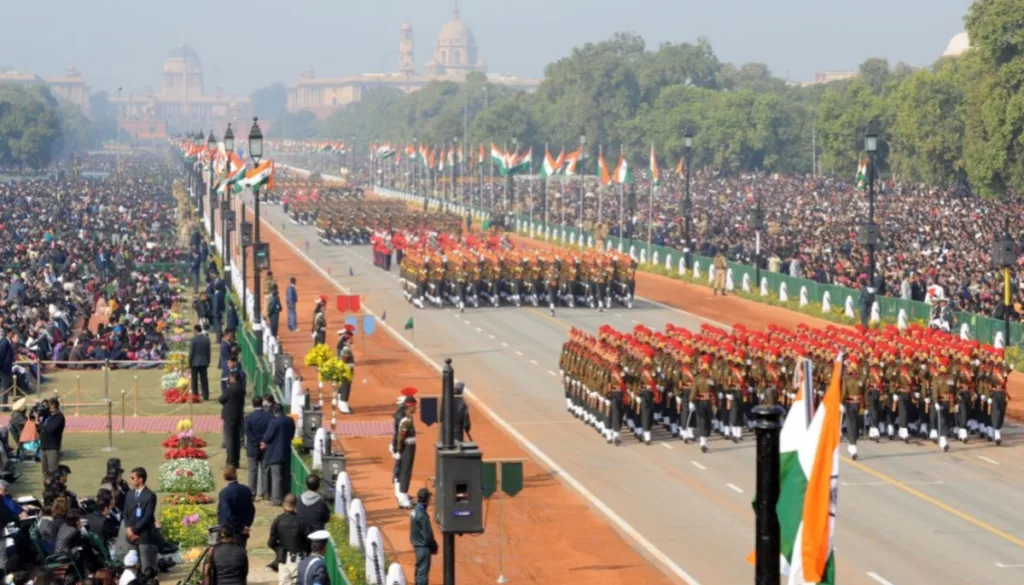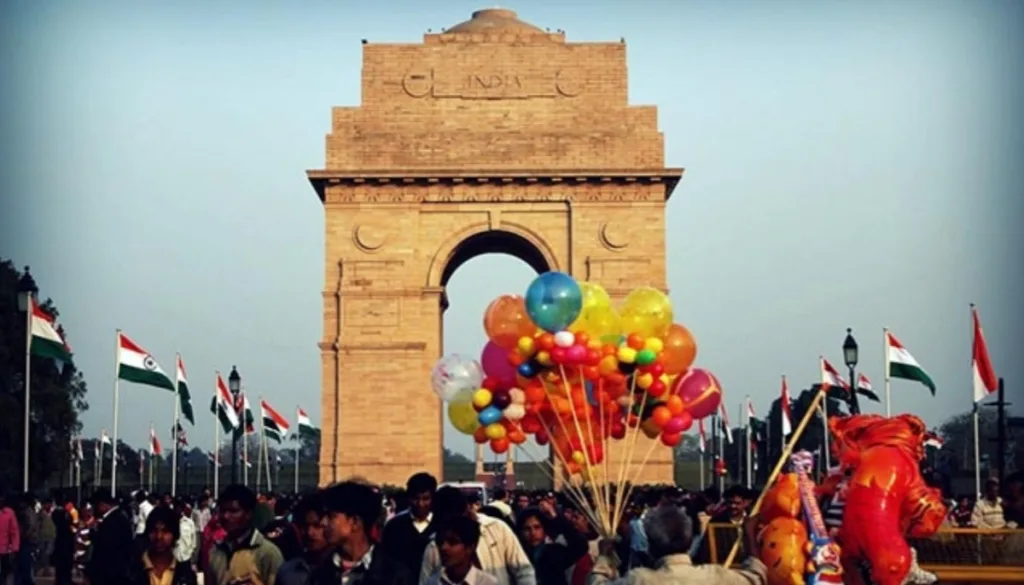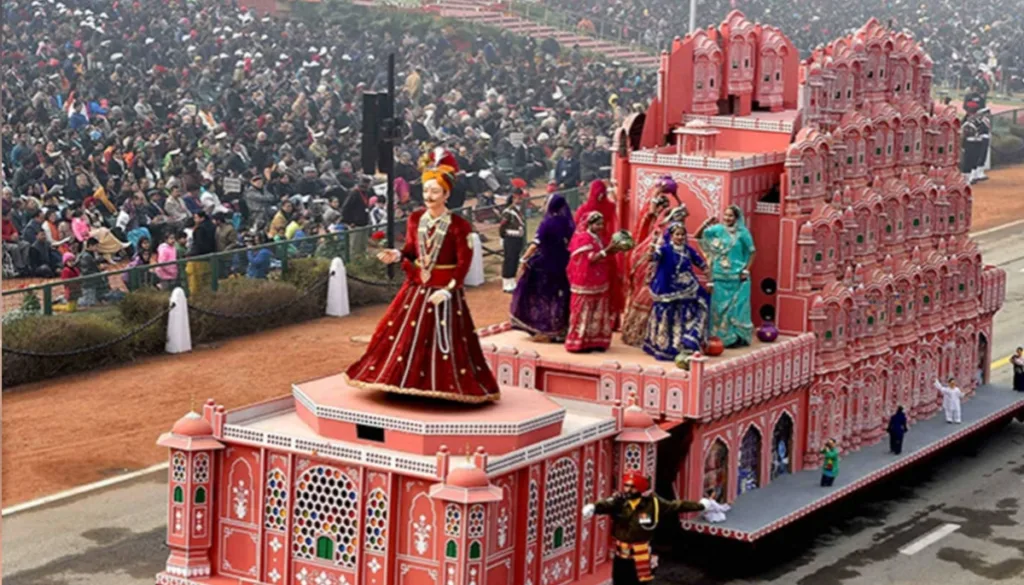
Introduction:-Republic Day of India 26 January,
Republic Day of India 26 January, In the vast tapestry of India’s history, one date stands as a testament to the nation’s unwavering commitment to democracy and unity — January 26th, celebrated with immense zeal as Republic Day. This auspicious occasion marks the day when the Constitution of India came into effect in 1950, replacing the Government of India Act (1935) as the guiding document, and India transitioned into a sovereign, socialist, secular, and democratic republic.
Defining Republic Day: Republic Day of India, observed annually on January 26th, is a commemoration of the adoption of the Indian Constitution, which heralded the birth of the world’s largest democracy. It represents a pivotal moment in India’s journey towards self-governance and symbolizes the nation’s collective commitment to the principles of justice, liberty, equality, and fraternity enshrined in its Constitution.
Importance of Republic Day: Beyond the grandeur of parades and cultural festivities, Republic Day of India holds profound importance in the hearts of every Indian. It serves as a reminder of the sacrifices made by the freedom fighters who valiantly battled for India’s independence. The adoption of the Constitution on this day reflects the culmination of their aspirations, laying the foundation for a democratic and inclusive society.
Republic Day of India is not merely a ceremonial event; it is a reaffirmation of the values that bind a diverse nation together. It calls upon every citizen to reflect on the essence of democracy, fostering a sense of unity in diversity. This day stands as a beacon, guiding the nation towards progress, justice, and the continual pursuit of a better, more equitable future.

Join us on a journey through the historical corridors, vibrant celebrations, and the enduring significance of Republic Day of India, as we explore the multifaceted layers that make this day an integral part of the nation’s identity.
Historical Background of Republic Day of India: Paving the Democratic Path:
The historical roots of Republic Day of India trace back to a tumultuous period marked by fervent struggles for independence against British colonial rule. The journey towards sovereignty was fraught with sacrifices and determination, culminating in the adoption of the Indian Constitution on January 26, 1950.
India’s Struggle for Independence: The struggle for independence was a formidable chapter in India’s history, characterized by the relentless pursuit of freedom from British colonial dominance. Spanning several decades, it saw leaders and visionaries mobilizing masses through non-violent resistance, civil disobedience, and inspiring calls for unity. Icons such as Mahatma Gandhi, Jawaharlal Nehru, Sardar Patel, Subhas Chandra Bose, and countless others became the architects of a movement that transcended regional, linguistic, and cultural divides.
Key Role of Indian Leaders: Mahatma Gandhi, with his philosophy of non-violence, became the moral compass of the freedom movement. Jawaharlal Nehru, the first Prime Minister of independent India, played a pivotal role in shaping the nation’s destiny and laid the foundation for its democratic institutions. Sardar Patel, known as the “Iron Man of India,” spearheaded the integration of princely states into a unified nation. Subhas Chandra Bose, through his indomitable spirit, rallied the Indian National Army against colonial forces.
As India’s leaders grappled with the enormity of the struggle, their collective vision extended beyond mere independence. They envisioned a democratic and inclusive nation where the principles of justice, liberty, equality, and fraternity would guide its course. The adoption of the Indian Constitution on Republic Day solidified these aspirations, marking the transition from colonial subjugation to a sovereign, democratic republic.
Republic Day of India , therefore, encapsulates not only the historical struggles for independence but also the visionary leadership that charted a course towards a democratic and pluralistic India. It is a day of remembrance, honoring the sacrifices of those who paved the way for a free nation, and celebrating the enduring legacy of democracy that continues to shape India’s identity.
Significance of January 26th: A Date Engraved in India’s Democratic Tapestry:
January 26th holds profound significance in the annals of Indian history, embodying the spirit of freedom, democracy, and the aspirations of a nation. This date is celebrated as Republic Day of India, marking the momentous occasion when the Constitution of India came into effect in 1950, transforming the country into a sovereign, socialist, secular, and democratic republic. The significance of January 26th is multi-faceted and resonates on several levels:
- Adoption of the Constitution: On January 26, 1950, India’s leaders formally adopted the Constitution, a meticulously crafted document that laid down the fundamental principles and laws governing the nation. This marked the culmination of years of deliberation and collaboration among the framers of the Constitution, symbolizing the collective will of the people to govern themselves.
- Transition to Republichood: The transition to a republic on January 26th was a decisive break from the colonial past. India, which had been under British rule for nearly two centuries, embraced a new identity as a republic, free from the vestiges of imperial authority. The adoption of the Constitution signaled the beginning of a self-governed era for the diverse and vibrant nation.
- Celebration of Unity in Diversity: Republic Day is celebrated with grandeur and diversity, reflecting the multicultural tapestry of India. The grand parade at Rajpath in New Delhi showcases the country’s military prowess, cultural heritage, and the rich mosaic of traditions from different states and regions. This celebration underscores the unity in diversity that defines India and reinforces the idea of a united, democratic nation.
- Historical Relevance: January 26th is not chosen arbitrarily; it holds historical significance as it commemorates the day in 1930 when the Indian National Congress declared the ‘Purna Swaraj‘ or complete independence. The day resonates with the ideals of the freedom struggle, making it a poignant reminder of the sacrifices made by those who fought for India’s liberty.
- Citizenship and Civic Responsibility: Republic Day of India is an occasion for citizens to reflect on their roles in a democratic society. It emphasizes the importance of civic responsibilities, the rule of law, and the democratic principles enshrined in the Constitution. It serves as a reminder that the strength of the republic lies in the active participation and responsible conduct of its citizens.
In essence, January 26th stands as a symbol of India’s commitment to democracy, justice, and the values embedded in its Constitution. It serves as an annual reminder of the nation’s journey towards self-governance and the enduring pursuit of a just and equitable society.
2 / 2
The Indian Constitution: A Blueprint for How India Works:
Imagine a big rulebook that helps a country run smoothly. In India, we have one, and it’s called the Constitution. Now, what’s a constitution? It’s like a set of rules that tells us how the country should be governed and how people should be treated.
Points:
- Rulebook for the Country: The Indian Constitution is like a super important rulebook for India. It was made to guide the country and make sure everyone is treated fairly.
- Written by Wise People: Imagine if some really smart and wise people got together to decide how the country should be run. Well, that’s exactly what happened! Our leaders and thinkers came together to write down all the rules in the Constitution.
- Basic Rights for Everyone: The Constitution talks about something called “rights.” These are like promises that everyone in India should be treated well. It says we all have the right to speak freely, follow our own religion, and be treated equally.
- Government Jobs: The Constitution decides how the government should work. It tells us about the different jobs in the government and what each job is supposed to do. It’s like giving everyone a specific role to make sure things run smoothly.
- President and Prime Minister: The Constitution talks about important people like the President and the Prime Minister. It explains what they can do and how they should lead the country.
- Laws for Everyone: The Constitution helps make laws. Laws are like rules that everyone in the country has to follow. If we have a problem or a disagreement, we can look at the laws to figure out what’s right.
- Changing with the Times: The cool thing about our Constitution is that it can change. As times change and we learn new things, we can add or change rules to make sure they still make sense.
In a nutshell, the Indian Constitution is like a big guidebook that helps keep things fair, sets the rules for the government, and ensures that everyone has certain rights. It’s like the superhero of our country, making sure India is a great place for everyone.
Republic Day of India Celebrations: A Big Party for India!
Imagine a day when the whole country comes together to celebrate how awesome it is to be a part of India. Well, that’s what Republic Day is all about! It’s like a huge party where we cheer for our country, remember our heroes, and have lots of fun.

Points:
- Flag Hoisting: The day starts with something really special. We raise our national flag high up in the sky. It’s like saying, “Hey, we’re proud to be Indian!”
- Parade Fun: Ever seen a big parade? Well, Republic Day of India has the coolest parade ever! It happens in the capital city, and there are tanks, soldiers, and all sorts of exciting things. It’s like a giant march showing off how strong and awesome our country is.
- Cultural Dances and Music: Imagine people from different states dressing up in colorful clothes and dancing to lively music. Republic Day of India is filled with these amazing cultural performances. It’s like a dance party that shows off the diversity and beauty of our country.
- Fancy Decorations: Streets and buildings get all dressed up with pretty decorations. It’s like the whole country is putting on its best clothes to celebrate this special day.
- Awards and Honors: Republic Day of India is also a time to say “Thank You” to people who’ve done great things for our country. Leaders give awards to heroes who have been super brave or done something amazing.
- Speeches and Inspiration: Leaders give speeches to inspire us. They talk about our country’s journey, our dreams, and how we can make India even better. It’s like a pep talk for the whole nation.
- Proud to Be Indian: Most importantly, Republic Day of India is a day to feel proud. Proud of our country, proud of our diversity, and proud of being a part of this big, colorful, and incredible Indian family.
In simple words, Republic Day of India celebrations are like a giant birthday party for India. We come together, have a blast, and celebrate what makes our country so fantastic!
Republic Day and Patriotism: A Celebration of Love for India:
Republic Day of India is not just a day off from school or work; it’s a day filled with love and pride for our country. It’s a special day when we show how much we care about India and everything it stands for. This feeling of love and loyalty for our nation is called patriotism.
Key Points:
- Love for the Tricolor: On Republic Day, we see our national flag, which has three colors – saffron, white, and green. Each color has a special meaning, and when we see the flag waving high, it reminds us of the unity, peace, and courage that make our country strong.
- Honoring Our Heroes: Republic Day of India is a time to remember and honor the people who fought for our freedom. These heroes did brave things so that we could live in a free and independent country. Their sacrifices make us feel grateful and proud.
- Unity in Diversity: India is a big, diverse family with people from different states, languages, and cultures. Republic Day is like a family reunion where we celebrate our differences and realize that, no matter where we come from, we are all part of one big Indian family.
- Respecting Our Constitution: The Constitution is like the rulebook of our country, telling us how we should treat each other and how the government should work. On Republic Day, we remember the promises in the Constitution, like the right to speak freely and the right to be treated fairly.
- Being a Responsible Citizen: Patriotism is not just about waving flags; it’s also about being a good citizen. It means doing our best to make our country a better place. We can help by being kind, following rules, and working together to solve problems.
- Feeling Proud of Progress: Republic Day is a time to look back and see how far we’ve come as a nation. We feel proud of our achievements and also think about how we can continue to grow and improve.
- Passing on the Spirit: On Republic Day of India, we pass on the spirit of patriotism to the next generation. We teach our children about the importance of loving their country, taking care of it, and working towards making it a wonderful place for everyone.
In simple words, Republic Day of India, is a big day for love and pride in India. It’s a day when we remember our heroes, celebrate our diversity, and promise to be the best citizens we can be. It’s a day to feel the warmth of patriotism in our hearts.
Personal Reflection on Republic Day of India: Connecting with the Heart of Patriotism:
Republic Day of India is not just a national celebration; it’s an opportunity for each individual to pause, reflect, and connect with the essence of patriotism. It’s a day to look inward and consider what being part of this diverse and vibrant nation truly means on a personal level.
Key Points:
- Gratitude for Freedom: Republic Day prompts personal reflection on the hard-fought freedom that we often take for granted. It’s a moment to express gratitude for the sacrifices made by those who paved the way for the liberties we enjoy today.
- Connection to Heritage: On this day, many people reflect on their cultural heritage and the rich tapestry of traditions that make up the mosaic of India. It’s a time to appreciate the unique customs, languages, and stories that contribute to the nation’s diversity.
- Responsibility as a Citizen: Republic Day of India invites a personal commitment to being a responsible citizen. Reflecting on the rights and duties outlined in the Constitution, individuals may consider how they can actively contribute to the well-being of the nation and its people.
- Celebrating Unity in Diversity: Personal reflection on Republic Day often involves celebrating the unity found within diversity. It’s an acknowledgment that, despite our differences, we are all part of one larger Indian family, bound together by a shared love for our country.
- Revisiting National Achievements: Individuals may use this time to reflect on India’s journey since gaining independence. From technological advancements to cultural achievements, it’s an occasion to take pride in the nation’s progress and envision a future filled with continued growth.
- Fostering a Sense of Belonging: Republic Day encourages people to reflect on their sense of belonging to the nation. It’s a reminder that each citizen plays a unique role in shaping the collective identity of India, contributing to the ongoing narrative of its history.
- Commitment to Democratic Values: Personal reflection can involve a commitment to upholding democratic values. It’s a call to actively practice principles such as justice, liberty, equality, and fraternity in daily life, ensuring these ideals are not just words but lived experiences.
- Inspiration for Positive Change: Republic Day of India serves as a source of inspiration for personal growth and positive change. It’s an opportunity to set goals aligned with national values, fostering an environment of compassion, inclusivity, and progress.
In conclusion, personal reflection on Republic Day of India is a meaningful journey into one’s connection with the nation. It’s a time to appreciate the freedoms enjoyed, acknowledge the responsibilities as a citizen, and renew the spirit of patriotism with a sense of purpose and pride.







